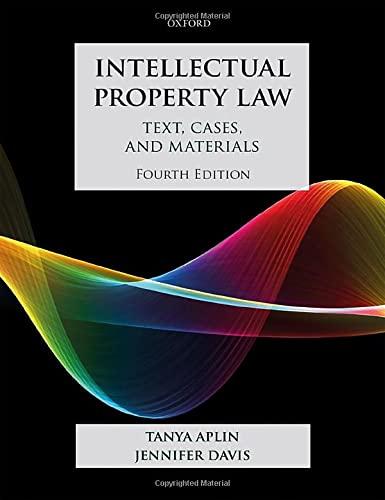Question
(Australian Law) Cassilk is a resident private company established in 2011 to manufacture quality fashion garments made of cashmere and silk. These garments are sold
(Australian Law)
Cassilk is a resident private company established in 2011 to manufacture quality fashion garments made of cashmere and silk. These garments are sold to retailers under several brand names and are also sold directly to the public.
Sales are made for cash, by credit card and by external financing arrangements [personal loan etc]. The only in-house financing arrangement by Cassilk is their 'CassilkSelect Club'. Under this arrangement customers may select fashion garments from the Cassilk catalogue (or the showroom displays) and pay by periodic instalment over an agreed timeframe. If the selected garment is not in stock, a production order is issued and the payment schedule usually corresponds to the projected delivery date. Title and possession of the garments does not pass until the final payment. If the stock is already available, a 'sold' sticker is attached and the garments are put to one side.
1.Should Cassilk return for tax purposes on a cash or accrual basis?
2.How should the company deal with payments received under the CassilkSelect Club arrangements and what tax consequences follow if customers default or fail to make all agreed payments?
3.How is trading stock the subject of CassilkSelect Club arrangements to be dealt with?
Cassilk is a member of nationwide purchasing cooperative, Luxury Fibre Wholesalers. Each year Cassilk is entitled to a bonus based on the aggregate amount of its purchases of trading stock and related supplies from Luxury Fibres Wholesalers. The bonus is credited, approximately 6 months in arrears. It is never paid in cash nor is it refundable in cash should the membership of the cooperative cease.
In this respect, the accounting records for Cassilk show:
Bonus receivable account.
Balance at 1 July 2019 232,000 Dr.
Credit granted(215,000) Cr.
Provision for credit to come223,000 Dr
Balance 30 June 2020240,000 Dr
4Is the bonus receivable ($223,000) and/or the credit granted of $215,000 assessable income for the year ended 30 June 2020?
5. If either amount is not assessable income, how is it to be dealt with for taxation purposes?
When answering each question, you are required to:
Identify and discuss the relevant provisions of the legislation, case law, ATO rulings and determinations; and
Advise the company of the correct legal position, giving reasons.
For assessment purposes, these requirements are equally weighted.
Note: Disregard GST and Small Business Entity related matters
Step by Step Solution
There are 3 Steps involved in it
Step: 1

Get Instant Access to Expert-Tailored Solutions
See step-by-step solutions with expert insights and AI powered tools for academic success
Step: 2

Step: 3

Ace Your Homework with AI
Get the answers you need in no time with our AI-driven, step-by-step assistance
Get Started


